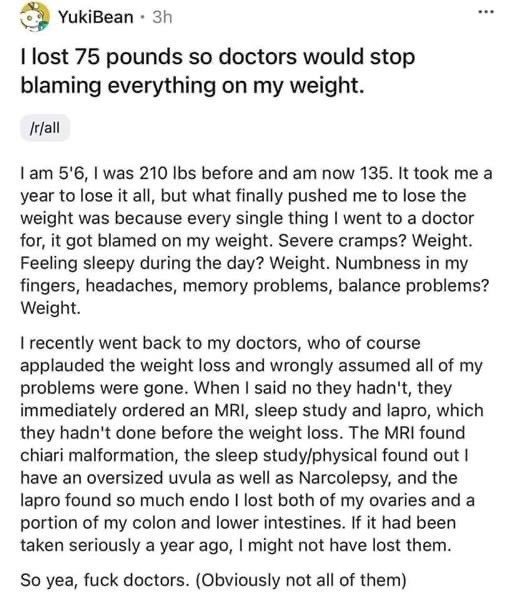#i hate this constant trend of haes
Explore tagged Tumblr posts
Text
According to a study by the NIH, which shares its findings with several other sources in a cursory Google search, weight gain and obesity can create, prolong, and intensify symptoms of Chiari malformations. Here's another study, this one by the largest not for profit Chiari research group, which draws the same conclusion. She likely was facing worse symptoms than she otherwise would have due to her weight, and the weight loss most probably improved her outlook.
The Journal of Investigational Allergology and Clinical Immunology found that oedema of the uvula was idiopathic- meaning no particular cause could be found- in over half of their participants in this study; the two identifiable predisposing factors were being overweight, and snoring (a factor more likely to be present in overweight and obese people than people of a recommended weight, according to the NIH- 70% of people with sleep apnea are obese, and 40% of obese people have sleep apnea, and 95% of people with OSA snore). Losing weight usually helps with these symptoms, but sometimes you can develop permanent problems to deal with if you got overweight in the first place, but weight loss is the first step towards healing.
Narcolepsy is more prevalent in overweight and obese populations, and more likely to be triggered upon such weight gain in predisposed individuals. It can end up as a vicious cycle, as people with narcolepsy tend to weigh 20% more than the average. There's not an insignificant probability that her being obese in the first place triggered the narcolepsy.
Endometriosis has a significant increase in incidence in obese populations compared to lower BMIs, complete with worse symptoms, a greater prevalence of severe dysmenorrhea, with an OR (odds ratio) of 1.979 versus all other populations at 1-1.05. There is no research proving that endometriosis 'grows' at any pace, least of all in the span of a year, as that would require a study do serial laparoscopies. In all likelihood, it was already that bad. (Also, on average, it takes 10 years for a woman to get an endo diagnosis, she's fucking lucky to have gotten it in a year!)
And before you say 210 isn't obese, it's a BMI of 34, which is obese. Being obese is a comorbidity to so many bad things, the BMI is not a moral judgement, it's an indicator of health risk. Please please please stop acting like it's irrelevant. It's very relevant.
All of her symptoms that she listed are things that can be caused by a myriad of issues, and pretty much all of them are either significantly more likely to occur if you're obese or significantly worse if you're obese. Being obese means you're at risk for way more issues- losing weight might not solve them, but it will mean that you aren't going to develop any more issues because of your weight.

This is why fat shaming can have tragic consequences.
#i hate this constant trend of haes#it's simply not true#fatlogic#it's straight up disinformation#the doctors here were in the right#almost everything listed is associated with the strain on the body's systems that comes with being obese#literally almost double the size of what the body was meant to support#how can you expect a heart to pump blood a body that needs twice as much as the heart was built to support#how can you expect a brain to run a body that is being stressed from merely existing at every moment of the day waking or sleeping#and balance problems? are you kidding me?#the more something weighs the harder it is to balance on a given surface area#that's just physics oh my god#feeling sleepy? of course you are#your metabolism is having to work overtime to sustain this body#the fact that there were underlying problems all of which are either caused associated with or worsened by obesity just goes to prove this
204K notes
·
View notes